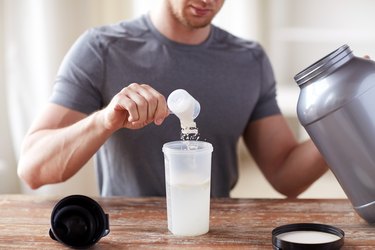
Creatine monohydrate is a nutritional supplement, available either as powder or creatine pills, used by many athletes in an effort to boost performance and muscle growth. But it's also produced naturally by your body in various organs, including your pancreas and kidneys.
While you're supplementing with creatine, your total serum creatine levels and the amount of creatine stored in your muscles increase, according to WebMD. But what happens if you stop taking creatine? These levels drop, which might cause some side effects, including fatigue, muscle weakness, weight loss or increased bloating and decreased natural creatine production.
Video of the Day
Video of the Day
Tip
When you stop taking creatine monohydrate, you may experience temporary side effects, including water weight loss, decreased creatine production in the body, fatigue and muscle weakness.
1. Feeling of Fatigue
Stopping creatine supplementation might cause fatigue, and if you have chronic fatigue syndrome, or CFS, stopping creatine might make your symptoms worse.
To understand this better, it's important to know what creatine does and how creatine gives you energy. About 5 percent of the creatine in your body is stored in your brain to assist with the energy-producing process involved in the production of brain hormones and neurotransmitters.
However, when total body creatine levels are reduced after you stop creatine supplementation, your brain might have a temporary lapse in the production of these compounds, leaving you fatigued.
2. Muscle Loss or Weakness
Most of the creatine in your body is stored in your skeletal muscles and used in the energy-producing metabolic pathways involved in movement and muscle contraction, according to Drugs.com.
Among the benefits of creatine, it increases your muscles' ability to produce large amounts of energy rapidly, which can increase your muscle strength and workout intensity.
When creatine levels in your muscles drop, so does your ability to produce energy, especially during exercise. This might leave your muscles feeling weak and might decrease muscle strength and exercise intensity.
3. Water Weight Loss
With every molecule of creatine that's stored in your skeletal muscles, several molecules of water are stored with it, a process known as muscle hydration. Muscle hydration results in your muscles feeling and looking more full and also can make you gain weight. The water weight gain you might experience while supplementing with creatine is sometimes falsely attributed to muscle gain.
When you stop supplementing with creatine, your muscles will not hold as much water, making you lose weight, sometimes up to 5 to 7 pounds, in the first several days to a week after stopping creatine.
4. Decreased Creatine Production
One of the possible effects of creatine supplementation — particularly taking too much creatine — is the overdependence on external sources of creatine, according to an August 2017 study in International Immunopharmacology.
When your body detects large amounts of creatine in your system, it might signal your organs to slow or stop production because your body is tricked into thinking it is overproducing creatine.
Once you stop creatine supplementation, your body might not be able to begin synthesizing creatine immediately. Although there is no evidence that suggests creatine supplementation will cause permanent damage to the organs that synthesize creatine, a short-term decrease in production following creatine supplementation has been observed.
Warning
Common creatine side effects may include nausea, diarrhea and weight gain. You should stop taking creatine immediately if you experience more severe side effects such as rapid heart rate, difficulty breathing, confusion or lightheadedness.
Frequently Asked Questions About Creatine for Workouts
What's the proper creatine dosage? And how often you should take creatine?
Traditional recommendations involve two phases of creatine supplementation: loading and maintenance. Loading involves taking 20 grams of creatine daily, split into about 4 or 5 doses, for 4 to 7 days, according to the U.S. National Library of Medicine. After the loading phase, you take between 3 and 5 grams daily.
However, a September 2015 study in the Journal of the International Society of Sports Nutrition outlines this dosing method, which does away with the loading phase and maintains a daily dose of between 3 and 5 grams of creatine.
Will I lose muscle if I stop taking creatine? Is creatine weight gain permanent?
Creatine didn't build your muscles — you did! Though hard work in the gym and proper recovery in between lifting sessions. So when you stop taking creatine (assuming that's the only major change you've made), your gains won't disappear overnight.
However, as mentioned above, you may lose water weight when you stop taking creatine. As a result, your muscles may not look as "full" and you may notice the number on the scale drop. But as long as you're maintaining a healthy body weight, this drop shouldn't be a cause for concern.
How long should you take creatine for? Do I need to take a break from creatine?
Experts recommend creatine cycling: After taking creatine for a maximum of 8 weeks, you should stop, allowing your body to self-regulate its normal production. As long as you keep working out, you won't lose your muscle gains. Take a 2-week break, and if you'd like, you can continue supplementation.
Does creatine increase testosterone?
No. Though the benefits of of creatine and testosterone are similar, the intake or increase of one doesn't affect the other.
- Drugs.com: "Creatine"
- WebMD: "Creatine - Uses, Side Effects, and More"
- International Immunopharmacology: "Beyond Muscles: The Untapped Potential of Creatine"
- Experimental Gerontology: "Effects of creatine supplementation on cognitive function of healthy individuals: A systematic review of randomized controlled trials"